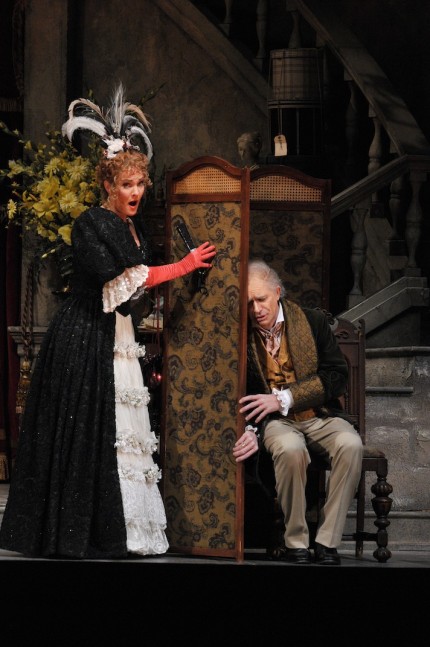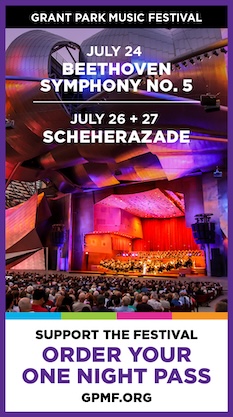Lyric Opera serves up a delightful “Don Pasquale”

It’s not difficult to figure out why Don Pasquale is receiving more performances than ever these days. Donizetti’s intimate comedy calls for modest forces, just four principals and a small chorus, making it an attractive proposition for companies focused on the bottom line.
Fortunately, the Lyric Opera’s production of Don Pasquale, which opened Sunday afternoon, offers considerably more in an opera that seems to receive fair-to-middling outings more often than memorable ones. With a stellar cast and skillful direction that gracefully blends the comedy and bel canto vocalism, Lyric’s winning Don Pasquale proved completely delightful.
The tale tells of the wealthy elderly title character who decides to disinherit his nephew Ernesto for becoming engaged to his beloved Norina, rather than the rich girl he picked out for him. To punish Pasquale, Norina and Dr. Malatesta concoct an elaborate prank wherein Norina (as Malatesta’s sister “Sofronia”) bewitches Pasquale and gets the lovelorn old man to marry her. After the contract is signed, she quickly becomes the bride from hell, spending his money, belittling him and stepping out on the town without him.
One so often hears aging comprimarios with worn voices in the title role. What a treat then to encounter Ildebrando D’Arcangelo—an Italianate bass in his prime, singing this role with robust tone and idiomatic agility.
In this role debut, D’Arcangelo delivered a terrific star turn. Aided by superb makeup that turned the 43-year-old Italian into a convincing septuagenarian, D’Arcangelo provided an engaging characterization, making the old Don into a foolish if lovable old man carried away with his romantic infatuation. Vocally D’Arcangelo is the real thing—a true Italian bass with refined, refulgent tone. He also possesses surprising agility for such a big voice, and D’Arcangelo threw off the rapid-fire patter at a lightning tempo with astounding clarity and even articulation.
Marlis Petersen provided a memorable performance in the Lyric Opera’s Lulu four years ago, a production that stands as a high point of recent Lyric seasons. The capricious Norina–who quickly becomes a scary shrew after her mock marriage to the smitten Pasquale— is a less lethal femme fatale than Berg’s Lulu, but Petersen showed herself equally deft at handling this more light-hearted role.
One wouldn’t think of Norina as a role that suits Petersen vocally and the German soprano seemed to be pecking at the bel canto line in So anch’io la virtu magica. But for the most part, she displayed the flexibility and high notes for the role and handled the coloratura writing and ensembles with fluid ease and panache. Petersen’s personality-plus Norina was consistently engaging—sly and charming but essentially good-hearted even showing remorse after she (as Sofronia) slaps Pasquale.
Just one year out of the Ryan Center, Renè Barbera is already launched on an impressive career. Barbera—who from certain angles is a ringer for the young Caruso—-has a notably big and vibrant lyric tenor but he tended to over-sing early on Sunday, with a strenuously can belto Sogno soave. Barbera scaled it down as the performance progressed, floating a lovely account of Ernesto’s canzonetta (Com’e gentil) and blending nicely with Petersen in the duet Tornami a dir.
Corey Crider, like Barbera, is a Ryan Opera center alum. He proved an inspired Malatesta, engaged in the prank but never oily or overly cynical. Crider possesses a resonant baritone yet wielded it with impressive skill, matching D’Arcangelo’s speed and accuracy in a dazzling account of the tongue-twisting duet, Cheti, cheti, immantinente.
Jean-Pierre Ponnelle’s production is not in the first flush of youth but still works effectively, the elegant eye-catching sets provoking admiring exclamations from some out-of-towners.
Unlike Francisco Negrin’s recent revisionist desecration of Massenet’s Werther, in his Lyric directorial debut Sir Thomas Allen’s staging was virtually faultless. In addition to showing refreshing respect for the score, the celebrated English baritone—a noted Malatesta in his day—kept the action moving fluidly, coming up with little bits of comic business for the principals that were consistently amusing.
Considering the Lyric Opera Chorus is currently rudderless after the “resignation” of chorus master Martin Wright a week ago, the ensemble provided polished and lively ensemble singing in their moments in Act 3.
While not the most nuanced or illuminating conductor, Stephen Lord is a sturdy and capable hand in this repertoire and provided admirable musical direction. Apart from some repeated horn bobbles, the Lyric Opera Orchestra delivered their usual supremely polished and sensitive playing. Matthew Comerford lifted a plangent, poetic trumpet solo at the opening of Act 2 (the first notes of which clearly provided source material for Nino Rota’s main theme from The Godfather).
Don Pasquale runs through December 15. lyricopera.org; 312-332-2244.
Posted in Uncategorized
